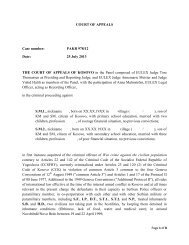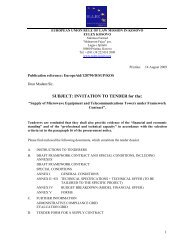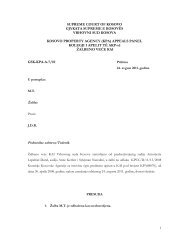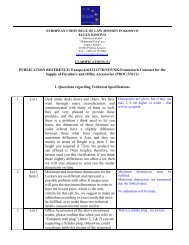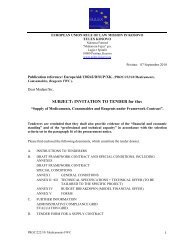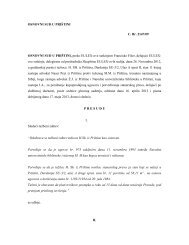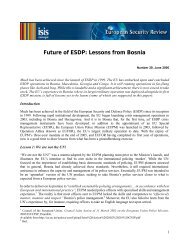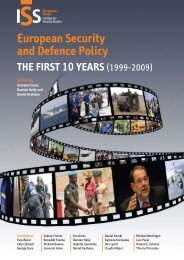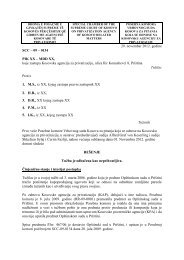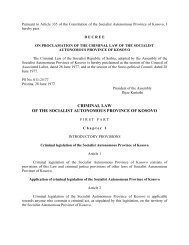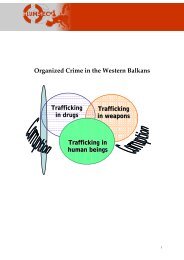English - Eulex
English - Eulex
English - Eulex
Create successful ePaper yourself
Turn your PDF publications into a flip-book with our unique Google optimized e-Paper software.
water, and necessary medical treatment. The inhumane treatment of the civilian detainees caused immense<br />
suffering or was a violation of the bodily integrity and health of those detainees and constituted an application<br />
of measures of intimidation and terror.<br />
COUNT 8<br />
From October of 1998 until late April of 1999, the three accused, acting in concert with other unidentified<br />
individuals and pursuant to a joint criminal enterprise, ordered and participated in the beating and torture of<br />
Kosovo Albanian civilians detained in the detention centre located at Llapashtica, in an attempt to force those<br />
detainees to confess to acts of disloyalty to the KLA.<br />
By ordering and participating in the beating and torture of Kosovo Albanian civilians [illegally] detained in the<br />
detention centres located at Llapashtica, Majac and Potok, the three defendants incurred personal and superior<br />
responsibility for the war crimes of inhumane treatment, immense suffering or violation of bodily integrity or<br />
health, application of measures of intimidation and terror and torture.<br />
COUNT 14<br />
From 2 August 1998 until late September 1998, the three accused, acting in concert with other unidentified<br />
individuals, and pursuant to a joint criminal enterprise, ordered and participated in the beating and torture of a<br />
Kosovo Serb whom they detained in detention centres located at Bare, Bajgora and other surrounding locations<br />
within the Llap Zone in an attempt to force him to confess to acts against the KLA or to provide intelligence<br />
information.<br />
The trial took place smoothly. The peak of interest was reached when the Kosovo Serb victim (see Count 14<br />
above) appeared before the re-trial panel to give his testimony; because of the need for adequate security<br />
measures to protect the witness, and the content and length of the testimony of the witness.<br />
As mentioned above, one of the accused was a member of the Kosovo Assembly and, therefore covered<br />
by immunity according to Article 75 of the Kosovo Constitution. The immunity of the accused was<br />
not opposed by the accused or his Defence counsel during the trial as a procedural limitation. It was<br />
nevertheless appropriate to clarify that, in the concrete case the Kosovo Constitution did not prevent a<br />
criminal prosecution for the specific allegation. Members of the Kosovo Assembly are granted functional<br />
immunity which, under paragraph 1 of art. 75, only covers them for actions or decisions that are within the<br />
scope of their responsibilities as deputies of the Assembly, clearly excluding acts which are not a function<br />
of the mandate of the member and – a fortiori – prior to their assumption of office as member of the<br />
Assembly. The crimes alleged in the indictment against this defendant were committed in 1999, before he<br />
took office as member of the Kosovo Assembly and therefore certainly outside the scope of paragraph 1 of<br />
Article 75 of the Kosovo Constitution.<br />
The verdict in the Lapi group case was announced on 2 October 2009: Latif Gashi was found guilty of the<br />
criminal offence of war crimes against the civilian population described in the above counts, as in the<br />
indictment of 30 June 2003. The court ordered that Latif Gashi remain in custody until the verdict becomes<br />
final, and he was immediately arrested. The order was appealed (see below).<br />
17



